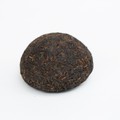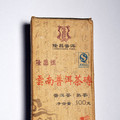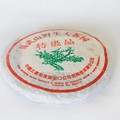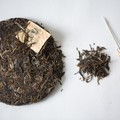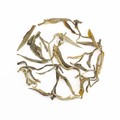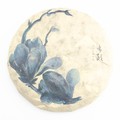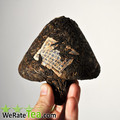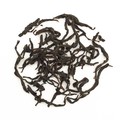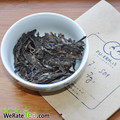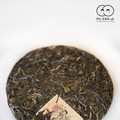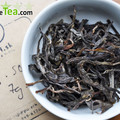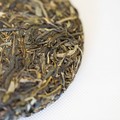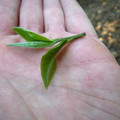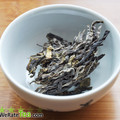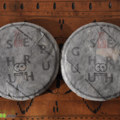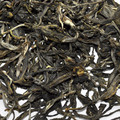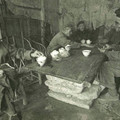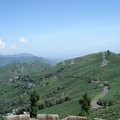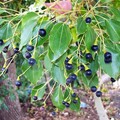Yunnan
Tea by type
Tea by region
Tea by years and other
Shu Tuocha 2003
 1 review
1 review„tailor-made” private production “Zhong Cha Gong Si” in Dayi (Menghai tea factory). This tea is made by a dayi employe on a special request from Taiwan. This is a perfect, aged shu pu-erh tea for a reasonable price. Why? It was produced in large scale so the final price of this tea is very affordable. It was stored in Taiwan and in 10 years transformed into a stage when this shu pu-erh is very tasty to drink. This private production tea is not burdened with a famous brand name so...
2010 Longchang Puer Brick 100g
 1 review
1 reviewShu brick 100g brought from China as a present. Unknown seller. Producer is LongChang Tea Co.
Big Green Tree Yiwu 2001
 1 review
1 review„tailor-made” private production “Zhong Cha Gong Si” in Dayi (Menghai tea factory), so in case you see the 2001 BGT paper wrapper looks different. This tea is made by a dayi employe on a special request from Taiwan. Material is ancient tea trees, I would say gushu at very high rate. Taste is nicely aged, fine and smooth but still could move forward as there is still bitterness that will in next years transform to sweetie tones. Storage in Guangzhou...
YiWu 2012 autumn
 1 review
1 reviewpressed by stone mold into 250 grams cakes, autumn maocha Massive sweetishness in the back of the mouth, already like in throat, fruity tones, buttery-biscuit like texture. The exact whereabouts of this tea garden is not known even to my 'buyer' friend in Jinghong
2013 A few Single Trees (maocha)
 1 review
1 reviewThis tea is a blend of a few single tree teas from Bangwei and Bulang. These trees stand out from their neighbours as some of the biggest and oldest trees in their gardens. This is a very special tea. It is composed of a large proportion of buds, from the first flush of Spring. The taste is very pure, thick and with plenty of strength. There is a hint of taste from the wok, perhaps it wasn't cleaned properly between batches during hand-processing, but this should settle over the...
2012 EoT Bulang Puer Tea 400g
 1 review, 1 comment
1 review, 1 commentThis tea was a bit of an experiment for us. We'd found 2 different maochas from Bulang mountain, which were each excellent, but in different ways. One was old trees from around Manmu village, while the other was old trees from a few km away. We went back and forth, trying to choose one of them to press into cakes, and in the end decided to blend the two teas. The Manmu was very pure in flavour with a strong qi and strong ku (pleasant bitterness), the other was thicker in the mouth and more...
2006 Longyu Brand Bulangshan Jin Cha Raw 250g
 1 review
1 reviewRaw Jin Cha is especially for Tibetan market, used to be mixed with milk, it is very helpful for the digestion. This Jin Cha is made of sun-dried large leaves material from Bulang mountain. The tea liquor is deep golden and flavored. Stimulation and rich in mouth with floral sweet aftertaste. This raw Jin Cha can also brewed in Tibetan way of tea with milk, butter and salt (or sugar).
2013 Wuliang Wild Hongcha
 2 reviews
2 reviewsThis tea is collected from ancient, wild trees on Wuliang mountain. These are truely wild trees, that haven't been planted by humans and average around 800-1000 years old. The leaves naturally have honey like characteristics in the taste and aroma, which lends them very well to being made into hongcha (Red/Black tea). I find it difficult to get excited by many hongcha - the oxidisation often seems to mute many of the characteristics of teas that I find most enjoyable. This one...
ManSa 2013 - blind tasting set 7
 1 review
1 reviewflowery, in some parts honey, narcotic aroma, taste goes to honey, sweetish tones, verry fancy tea, just like teas from Mansa are this spring hand-pressing of pu-erh cakes was done in a very skilled manufacture in Yiwu, is more tight than previous years, there is more work for me when taking apart the tea leaves for samples, but for long term storage the tight pressing will allow keep longer the aromas, the tea leaves won't dry that much, during this tighter pressing the man...
YouLe 2013 - blind tasting set 6
 1 review
1 reviewdense, rich, bitter-sweet, fruity aroma, full body floods the whole mouth and gives a feeling of oily brew, later steeps taste bitter-sweetish leaving a nice feeling in a mouth, the tea is a great premise for aging, strong, tight pressing has already started up the fermentation this spring hand-pressing of pu-erh cakes was done in a very skilled manufacture in Yiwu, is more tight than previous years, there is more work for me when taking apart the tea leaves for samples, but for...
ManZhuan 2013 - blind tasting set 5
 1 review
1 reviewsweetish, rich, dense taste is apparent from the first brewing, in the second brew the fine gushu bitterness appears, in the cup you can feel nice flowerish aromas, pu-erh teas from Manzhuan has the ability even during his first year of aging to transform to sweet, honey like tones, that can be noticed in the tea even now, be careful with the dosage, number of grams used, this is a really powerful tea that with high dosage could be a very bitter like brew, these cakes unlike the others spring...
Bulang Shan 2013 - blind tasting set 4
 1 review
1 reviewrich and delicate bulang bitter taste with sweetish aftertaste, sweet tingling almost in the throat, after the third cup of this tea have one cup of warm water and at once you will understand what is this tea about this spring hand-pressing of pu-erh cakes was done in a very skilled manufacture in Yiwu, is more tight than previous years, there is more work for me when taking apart the tea leaves for samples, but for long term storage the tight pressing will allow keep longer the...
NaKa 2013 - blind tasting set 3
 1 review
1 reviewthis tea is sold only as a sample, each order is limited to have only 2 samples of this tea aroma of a freshly baked bread with fruity tones, very specific scent and taste, energetic bitternes, in some parts very similar to the one from Lao Banzhang, disappearing after a while and leaving strong and pleasant aftertaste, the similarity with Banzhang they say it is used in good fakes of Lao Banzhang, this year this tea sold only as samples, the ordered 5 kg of this was sold on...
HeKai 2013 - blind tasting set 2
 1 review
1 reviewnicely balanced bitterness with a breze of sweetness, beautiful honey-fruity aroma, pleasant and pure feeling after swalowing the tea in the mouth, in the second brew there is already the richness and dense texture of the tea soup, already after a few sips a steady aftertaste, or rather taste sits on the tounge with a mounth-drying effect, the cup gives parfume like scents, the next brews are tough and syrupy, condense flavours, I would describe in overall the taste as rounded, softened...
BaDa 2013 - blind tasting set 1
 1 review, 1 comment
1 review, 1 commentthe pressed leaves aroma is strong and fruity, the taste is bitter, nutty, almond, fruity, fresh, balanced, very pleasent, fancy like Banzhang like bitterness, slowly disappearing in the mouth, raising salivation with dryness in the mouth this spring hand-pressing of pu-erh cakes was done in a very skilled manufacture in Yiwu, is more tight than previous years, there is more work for me when taking apart the tea leaves for samples, but for long term storage the tight pressing...
Theme
Quotes
„Tamaryokucha (玉緑茶, lit. ball green tea) - Tamaryokucha has a tangy, berry-like taste, with a long almondy aftertaste and a deep aroma with tones of citrus, grass, and berries. It is also called Guricha.“
Latest posts
01.01.2016 @ 18:14:35 - Eternal Spring:
WeRateTea.com wish you all the best for 2016!...
07.12.2015 @ 09:07:02 - sypalino:
I decided to taste this tea 2 weeks after delivery. The cake is lightly pressed, so...
09.11.2015 @ 21:58:19 - Eternal Spring:
Comparison of 2013 Bada Pu-erh.sk with <a...
09.11.2015 @ 09:34:07 - Eternal Spring:
Lao Yu 2013 is now about 2,5 years old tea and out of this 1,5 year stored in Europe....
09.11.2015 @ 09:33:11 - Eternal Spring:
Comparison of all three Lao Yu is now done :)
15.10.2015 @ 11:06:37 - Eternal Spring:
2015 Chawangpu Collection – I can only tell, that all teas are very good :)
09.10.2015 @ 10:31:19 - Eternal Spring:
It was quite long and difficult tasting to make a decision… There is still quite...
24.01.2015 @ 16:55:57 - Eternal Spring:
WeRateTea.com wish you all the best for 2015!...
30.12.2014 @ 17:19:22 - Eternal Spring:
"FT(For Taiwan)" means this brick was a special order of "Fei Tai" Company. Fei Tai...
13.08.2014 @ 18:24:28 - Eternal Spring:
We compared two teas from Youle. 2005 Jinuo Shan You Le "Red Sun Drum" and 2009...
Tea by region
We will help you with tea selection.
Do you like quality loose tea?
We will help you to find the right one for you. Be inspired by tea ratings of other tea lovers. Rating stars could help you.


Review your cup of tea.
Review the tea you are drinking and help other tea lovers to find the right cup of tea.






 Shops
Shops
